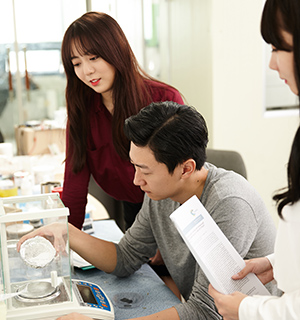
The Department of Environmental Engineering offers a curriculum designed to produce professionals who can solve environmental problems with their education and knowledge in basic theories and application of physical, chemical and biological processes and engineering knowledge in design, planning, construction and maintenance of environmental facilities. The Department has exclusive labs for each major and supports students’ research by providing the most advanced research equipment.
Location : Rm.305-1, Bima Hall
Tel : 82-2-940-5180
Fax : 82-2-911-2033
e-mail : hera316@kw.ac.kr
Website : http://env.kw.ac.kr/
Course Descriptions
Air Pollution Engineering Laboratory
Theory and practice of emission sampling, standard and techniques of pollutant identification and analysis.
Air Pollution 1, 2
Effects and sources of air pollutants, meteorology, and dispersion of pollutants in the atmosphere are covered.
Air pollution Modeling
Air pollution sources and source control, chemistry and meteorology of the atmosphere, atmospheric diffusion, equipment performance and engineering processes for air emission control.
Air pollution Control 1, 2
Air pollution sources and source control, chemistry and meteorology of the atmosphere, atmospheric diffusion, equipment performance and engineering processes for air emission control.
Design of Air Pollution Control Devices
Principles and modern practices employed in the design of engineering system for the removal of pollutants. Design of control devices based on physical and chemical characteristics of polluted gas streams.
Design of Water Supply and Sewage Systems
Design and layout of water distribution systems, sewage collection systems and pumping stations.
Noise and Vibration
Characteristics, measurement, effects on humans, and controlling techniques of noise and vibration.
Hydrology
Precipitation, flow measurement and translation of hydrograph. Treatment of basic principles to apply practical work includes probability in hydrologic events.
Water Quality Management
Sources and usage of water, types and effects of water pollution, water quality criteria, lake and river water quality management are covered.
Water Analysis
Standard analytical procedures for measuring water quality and efficiencies of wastewater treatment processes.
Water Analysis Laboratory
Laboratory analysis of standard analytical procedures for measuring water quality and efficiencies of water treatment processes.
Water Chemistry
Treatment of theory and technique of water analysis to control water quality and water treatment processes.
Water and Wastewater Treatment Laboratory
Techniques of physicochemical processes that are applied to water and wastewater treatment.
Numerical Analysis
Application of numerical methods to problems in various areas of engineering and sciences, personal computer case studies, development and comparison of techniques for roots of nonlinear equations, simulations of linear algebraic equations, curve fitting, numerical integration and ordinary differential equations.
Treatment of Sludge and Manure
Dealing with treatment of sludge and manure and its application.
Indoor Environmental Engineering
Design and evaluation of heat, sound and light as part of the indoor environment.
Combustion 1, 2
Dealing with method of combustion calculation and combustion application.
Water Treatment Engineering 1, 2
Fundamentals and application of physicochemical processes used in water and wastewater treatment systems.
Design of Water Treatment Devices
Treatment of laboratory equipment and design of treatment devices to decide factor affecting treatment efficiency.
Fluid Mechanics 1
Basic theory of fluids especially in pipes. Incompressible fluids are the main subjects.
Fluid Mechanics 2, 3
Application of basic fluid mechanics and hydraulics of open channels, flow measurements and hydraulic machinery.
Hazardous Waste Management 1, 2
Hazardous waste assessment and remediation in part of hazardous waste management.
Hazardous Waste Treatment 1, 2
After going through the background of hazardous waste, dealing with treatment of hazardous waste for studying pollutant's fate and transport.
Groundwater Modeling
Principles of groundwater model using imaginary scenario and computer program for groundwater pollution control.
Groundwater Contamination and Control
Transfer and types of pollutants for controlling the groundwater contamination.
Reinforced Concrete Design
Theory and design of reinforced concrete members and structures. Application to both simple and continuous girders and frames applicable to environmental facilities.
Soil Contaminant and Remediation
Treatment of soil contamination sources and types of controlling soil contamination and remediation.
Composting 1, 2
Dealing with hazardous assessment and composition of hazardous waste.
Waste Management 1, 2
Dealing with system and process of urban waste from source to treatment.
Waste Treatment 1, 2
Generation, collection and disposal of solid waste are covered. Recovery and sanitary landfill of solid waste are also covered.
Lab. of Solid Waste 1, 2
Analysis of chemical composition, moisture measurement, and sample collection of waste.
Design of Waste Treatment Facility
Application of waste treatment skills to compare the difference between theory and practice.
Wastewater Treatment Engineering 1, 2
Industrial wastewater sources and characteristics, significance of industrial wastewater as environmental pollutants, application of standard and special treatment processes.
Design of Wastewater Treatment Devices
Selection, evaluation, and design of wastewater treatment process and system.
Marine Pollution
Types, sources and controlling methods of marine pollution.
Environmental Equipment Engineering
Basic electronics applicable to the planning of water distribution, municipal waste treatment and environmental control devices.
Introduction to Environmental Engineering
General topics of water pollution, air pollution and other types of pollution and their control methods.
Environmental Engineering Laboratory
Dealing with skills of analysis, separation and cultivation of microorganism.
Environmental Seminar
Application of environmental engineering to the real world of engineering. Data collection, design project and presentation are included.
Environmental Impact Assessment
Assessing techniques and methodology of environmental impact by man's activity, such as air environment, water environment, noise environment, biological environment, cultural environment and socioeconomic environment.
Environmental Organic Chemistry
Structure of simple organic compound, reaction mechanisms and nomenclature of organic compounds, application of basic reactions in organic synthesis.